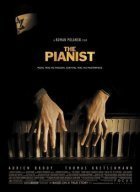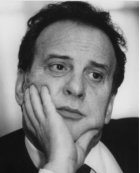
The Pianist Page #8
Szpilman walks on, hears a noise, looks back to see a SECOND
CHILD trying to wriggle through the same hole. But he's
stuck. Angry German voices from the Aryan side.
2ND CHILD
Help me! help me!
Szpilman goes to him, pulls him with all his might but the
boy is jammed in the hole.
From the other side of the wall, the sound of an angry
German voice and of a boot stamping violently on the boy.
The boy screams in agony.
Szpilman continues to try to pull the boy through.
The sound of the German voice swearing and the dull,
crunching noise made by the boot smashing into the boy
continues, and with every thud the boy screams in terrible
pain.
Szpilman struggles to help the boy whose screams are
becoming weaker yet increasingly desperate.
Szpilman pulls his arms and finally manages to get him
through. The boy lies moaning.
Szpilman takes the boy's face in his hands, tries to comfort
him, revive him, but the boy has stopped moaning. His head
lolls and his jaw sags. He is dead. Szpilman stands quickly
and hurries away.
EXT. COURTYARD AND HOUSE - EVENING
Szpilman approaches the house through a shabby yard.
INT. JEHUDA ZYSKIND'S ROOM - EVENING
The noise of a mimeograph machine. A huge, CHEERFUL MAN
with a perpetual cigarette in his mouth.
JEHUDA:
I always say look on the bright
side. You're in the small ghetto,
intellectuals, professional people,
you're better off than us. Here,
in the large ghetto, it's a
cesspool. But you, you're living
in Monte Carlo. You could say you're
privileged and that, of course,
goes against my principles.
Nevertheless...
He laughs and coughs, starts looking through papers. His
room is piled from floor to ceiling with old papers and
stuff. Dark, shabby, run-down.
One of his sons, SYMCHE, is operating the mimeograph
machine. The other, DOLEK, is sorting the sheets as they
come off the roller. MRS. ZYSKIND, holding a toddler, is
cooking at a small stove.
JEHUDA finds what he's been looking for, a newspaper made
up of a few sheets.
JEHUDA:
Ah, here. Today's news from the
other side.
SZPILMAN:
You're amazing, Jehuda.
JEHUDA:
No, I'm a socialist. I have brothers
everywhere. They bring me news and
food. We care about our fellow
human beings. Workers of the world
unite.
SZPILMAN:
So, what's the news?
JEHUDA:
(scanning the paper)
Kharkhov.
SZPILMAN:
I don't know why I come here every
evening, it's always such bad news.
JEHUDA:
Bad news, you crazy? You have no
world view, Wladek, that's your
trouble. The news couldn't be
better. The moment Hitler invaded
Russia, I knew we'd be all right.
Remember Napoleon. Same business.
The Germans will freeze to death,
please God.
He beams. Szpilman leans over, takes a sheet from the
mimeograph.
SZPILMAN:
Jehuda, give me something to do.
JEHUDA:
You're an artist, Wladek, you keep
people's spirits up. You do enough.
SZPILMAN:
But I want to help, I want to.
JEHUDA:
You're too well known, Wladek. And
you know what? You musicians don't
make good conspirators. You're
too...too musical.
He loves this, laughs, coughs.
SZPILMAN:
There are notices going up. The
city's to be cleansed of
undesirables.
JEHUDA:
There are always notices going up.
A distinctive knock on the door. Szpilman tenses but Jehuda
beams. To one of his boys: Symche - The boy opens the door
to admit a short, neat man, MAJOREK.
MAJOREK:
Hello, Symche, Dolek, Mrs Zyskind,
Jehuda. Working hard?
He stops, seeing Szpilman.
JEHUDA:
Majorek, this is the greatest
pianist in Poland, maybe in the
whole world. Wladyslaw Szpilman.
Meet Majorek.
MAJOREK:
(shakes Szpilman's
hand)
I know your name. I've never heard
you play.
JEHUDA:
Majorek used to be in the army.
Brilliant man. He's got a mind
like a searchlight. The only thing
I've got against him is he's not a
socialist.
(he looks out of
the window.)
You'd better go now, Wladek. It's
nearly curfew.
(he hands over
pamphlets to
Majorek.)
You see these, Wladek? You know
how many copies we print of our
newspaper?
Translation
Translate and read this script in other languages:
Select another language:
- - Select -
- 简体中文 (Chinese - Simplified)
- 繁體中文 (Chinese - Traditional)
- Español (Spanish)
- Esperanto (Esperanto)
- 日本語 (Japanese)
- Português (Portuguese)
- Deutsch (German)
- العربية (Arabic)
- Français (French)
- Русский (Russian)
- ಕನ್ನಡ (Kannada)
- 한국어 (Korean)
- עברית (Hebrew)
- Gaeilge (Irish)
- Українська (Ukrainian)
- اردو (Urdu)
- Magyar (Hungarian)
- मानक हिन्दी (Hindi)
- Indonesia (Indonesian)
- Italiano (Italian)
- தமிழ் (Tamil)
- Türkçe (Turkish)
- తెలుగు (Telugu)
- ภาษาไทย (Thai)
- Tiếng Việt (Vietnamese)
- Čeština (Czech)
- Polski (Polish)
- Bahasa Indonesia (Indonesian)
- Românește (Romanian)
- Nederlands (Dutch)
- Ελληνικά (Greek)
- Latinum (Latin)
- Svenska (Swedish)
- Dansk (Danish)
- Suomi (Finnish)
- فارسی (Persian)
- ייִדיש (Yiddish)
- հայերեն (Armenian)
- Norsk (Norwegian)
- English (English)
Citation
Use the citation below to add this screenplay to your bibliography:
Style:MLAChicagoAPA
"The Pianist" Scripts.com. STANDS4 LLC, 2024. Web. 24 Dec. 2024. <https://www.scripts.com/script/the_pianist_72>.



Discuss this script with the community:
Report Comment
We're doing our best to make sure our content is useful, accurate and safe.
If by any chance you spot an inappropriate comment while navigating through our website please use this form to let us know, and we'll take care of it shortly.
Attachment
You need to be logged in to favorite.
Log In